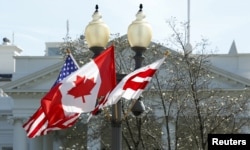U.S. President Barack Obama swept into office in 2008 on a progressive agenda – vowing change.
This week, he is welcoming a leader whose recent election mirrors his own; new Canadian Prime Minister Justin Trudeau makes a White House state visit on Thursday.
“There is a developing special relationship between this president and prime minister. Both young leaders with similar visions, both have a progressive vision of governing, both very much committed to the appropriate use of multilateral tools, both committed to diversity,” the National Security Council’s Mark Feierstein told reporters.
This is the first state visit by a Canadian prime minister in nearly two decades, and White House officials promise a hefty agenda, focused on security, trade and climate change.
“Canada has stood with us in response to the Ebola crisis, the fight to destroy ISIL, the enforcement of sanctions on Russia and in securing consensus of the Paris agreement on climate change,” Feierstein said Tuesday.
Obama and Trudeau met before on the sidelines of Asia-Pacific Economic Cooperation summit last November, just a month after Trudeau’s Liberal Party swept Canada’s parliamentary election – unseating Prime Minister Stephen Harper and the Conservatives that had been in power since 2006.
“The first call I made to him I said, Justin, congratulations. You and your family look great. I know Canadians are incredibly inspired by your message of hope and change. I just want to point out that I had no grey hair when I was in your shoes seven years ago,” Obama joked to reporters following the talks in Manila. Obama was 47 when he first took office.
Countering Islamic State
Justin Trudeau, son of former Prime Minister Pierre Trudeau, made headlines in February when he announced Canada’s withdrawal of six fighter jets from the U.S-led coalition against the Islamic State (IS) militant group – following through on a campaign pledge.
Instead, the 44-year old leader said Canada would triple the number of special forces trainers from 69 to nearly 200 in northern Iraq, while increasing intelligence and humanitarian efforts in the region.
White House officials on Tuesday highlighted what they called Canada’s important and founding role in the anti-IS coalition and said the administration is satisfied with the country’s contributions.
“They are working across all the lines of effort that we are focused on, military, foreign terrorist fighters, counter- terrorist financing, counter-messaging and stabilization,” NSC’s Senior Director for Western Hemisphere Feierstein noted.
The Canadian prime minister has also garnered attention for his warm reception of Syrian refugees – personally greeting families in December as they stepped off the plane in Toronto with the words “you are home, welcome home.”
“We very much applaud Canada’s leadership on the Syrian refugee crisis...and congratulate them for meeting the goal of admitting 25,000 Syrian refugees to Canada, and the welcoming way in which Canadian citizens did so,” Assistant Secretary of State Roberta Jacobson said.
Boosting trade, fighting climate change
Trade and climate change are also expected to feature prominently during Thursday’s talks at the White House.
Senior administration officials point to Canada’s status as the United States’ largest trade partner, with nearly 400,000 people and some $2 billion worth of goods and services crossing the 8,851 kilometer border every day.
About 75 percent of Canada’s exports go to the United States and Canada is the top export destination for 33 U.S. states, White House officials say.
Still, officials say more work is to be done to open the border that has seen the number of crossings drop due to enhanced security measures following the September 11 terrorist attacks.
The Trans-Pacific Partnership agreement will also play a prominent role in trade discussions, as lawmakers in both countries consider the deal.
On climate change – White House officials praised Canada’s cooperation on the issue.
“We appreciate the very constructive and effective role that Canada has played in working closely with us in securing a strong agreement at COP 21 in Paris, and we look forward to continuing that working relationship with Prime Minster Trudeau’s government this year to maintain momentum,” White House Special Envoy for Climate Change Todd Stern said.
Trudeau’s state visit Thursday is the Obama administration’s 11th.
The White House says previous state visits include India in November of 2009, Mexico in May of 2010, China in January of 2011 and September of 2015, Germany in June of 2011, South Korea in October of 2011, Britain and Northern Ireland in March 2012, France in February of 2014, Japan in April of 2015, and Pope Francis’ visit in September of 2015.
Jean Chretien was the last Canadian prime minister to attend a state dinner in 1997 – hosted by then-U.S. President Bill Clinton.





